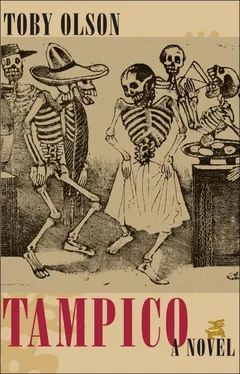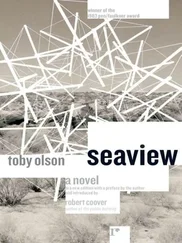But now his father was an old man and asking plaintively, and though he thought of the fire then, and blame, and his father leaving him, and his own first years of difficult bewilderment in the north, it was long ago and he’d not really thought of it with any feeling in many years. Forgiveness was beyond question now and even a little silly he thought, but his father was asking him for it here, though really for release from it as possibility, and as he looked over and saw his milky eyes, the same, he thought, as he had seen in his awakening to the fire after he had hit his head and fallen so many years ago, he hesitated to speak the real thing, so impossibly complicated, and only said, “Sometimes. She was a good woman. But it was the lunch hour, wasn’t it? And she was probably talking with her friends.”
“I don’t know,” his father said. “But I, too, think of her.”
Alma paused at the meadow’s edge, then turned to move along it for a few yards, until he found the trail again, and they started up the mountain among the trees. The trail was narrow, and they were in single file, branches hanging over them, sometimes low enough so they had to duck their heads. Carlos saw a branch brush against John’s hat, waking him, and saw him shift and settle on his saddle blanket, kick free of his stirrups and stretch his legs. The others were all attentive now, like the horses, no one beside them to infect them with a borrowed exhaustion, each in his own thoughts. Even Ramona seemed completely recovered behind her father, and Carlos saw her reach to the pink cosmetic case hung from her horn, remove a tube of lipstick and a small mirror, which sent a dim disk of light into the trees as she raised it to her face. Then he looked beyond her and saw mist in the trees, and soon they were climbing into it and Alma was no more than a misty shadow up ahead, and Carlos felt the moisture soaking through his pants to wet his legs and groin. They were in it for a good half hour, the horses blowing steam, and Carlos could see his own breath on the air. They were soaked through to the bone before they left it and climbed up into sunlight, which brightened over them as they moved out from under the canopy of branches and leaves and came into a small, mossy clearing, beyond which, just a few yards ahead, was the gateway to another world.
They were sitting their horses near the mouth of what had once been a street, and that city name seemed appropriate to Carlos because of the remnants of actual curbing he saw to his left and right, stone that had obviously been cut and polished and though broken in places now and twisted from its mooring still marked the course of a concave gutter where rainwater had run off. And the street itself was slightly domed for the purpose of drainage, and in the hard packed earth at the horses’ hooves he could see leavings of cobblestone, places where the dirt had washed away in rain. To either side of the street and above the curbs were a few half-ruined planters, massive low rectangles of stone holding dark dirt that had been turned and mulched recently, and growing in the dirt were small tight roses of various rich hues, above which he could see the dark doorways and thatched roofs of a meandering row of huts to the left, a wooded hill rising beyond them, the trees smaller but heavier in rich green foliage here in sun and light air at the mountain’s top.
Alma touched his horse’s flanks with his heels and it dipped its head and started off immediately, as if it had waited for the touch as signal and not urging, and Carlos could hear the horses’ hooves click on the stone leavings as they formed into pairs again and followed Alma’s lead, riding only a few dozen yards until they reached the mouth of the street and the large square opening before them and Alma pulled up again, motivated, Carlos thought, by occasion rather than pragmatic end. They were at the formal entrance to the city, and while there was no gate, he could see in the way the large rectangle presented itself, at least three hundred yards in length and gracefully wide, that they had come to the place of arrival and needed a moment to absorb the architecture.
Off at the sides of the space, which Carlos immediately thought of as an agora, were rows of low public buildings. They were fashioned in stone, and though for the most part their façades were intact, he could see places where the fluted carvings above doorways at roofline had broken away and fallen, and some walls had collapsed too, vacant spaces at a few buildings’ sides, as if fitted pieces from a jigsaw puzzle had been lifted away. There was no rubble in sight, and fronting the rows of buildings, these structures that had obviously been designed and built to make a pattern, he could see what remained of a broad sidewalk, sunken now, yet bordered on the near side by a low stone wall, and he could see breaks in that wall, places where people and vehicles might enter. In the distance, on the left, was a building that was wider than the rest and with a wider entranceway, a stone arch, the mouth of which was high enough to allow a man on horseback to ride through in comfort, and Carlos saw motion in a square stone window to its side. Then a horse’s head appeared in the window and his own horse lifted its head and whinnied softly, and Carlos knew this was not some makeshift stable, but a structure planned in recognition of the importance of animals, for their care and use, and for convenience, as important as the building he noted to the far side, beyond the animal watching them, a bank he thought, or at least a commercial exchange of some kind. There were figures carved in the stone above the double doorway, possible letters of some alphabet, but too far away to make out.
Manuel’s horse moved to his side, and he felt his father’s fingertips on his thigh and looked over to see him pointing toward the agora’s far end. Carlos noted the low fountain complex near the square’s center, then picked up the distant building his father had indicated. It was there at the very end of the public space, a modern glass-and-steel affair, a house he thought, but completely out of place here among these ancient structures. He could see sun shining in the broad glass windows, the graceful curve of a wide deck fronting it. A glass house, he thought, trying to locate it, make it stick here where it did not belong.
Alma turned in his saddle then and beckoned to them, and each urged his horse ahead behind him, Ramona’s touching its muzzle into the flank of Gino’s familiarly, and they rode in at the mouth of the square, then headed off to the right, where up ahead and beyond the fountain in the distance, Carlos could see a lower structure in the line of structures there and could see a squat chimney above it and wisps of smoke floating up into the clear sky, and on the low hill that rose beyond the square’s perimeter above the chimney, he could see a meandering flow of cultivated fields, broad ribbon swaths where dense ground cover had been uprooted and plowed under, and a crop growing there and waving in the light breeze.
Then he saw a few people, a woman in a woven poncho that fell to her bare thighs, her hair gathered tight against her scalp and very dark, and two men, scantily dressed in loincloths, or shorts of some kind, their chests bare and smooth and glistening in the sun. Unlike the woman, their hair hung to shoulder length, one raven and thick, the other’s head framed in blond ringlets Carlos thought might be the product of some vegetable dye. Alma was guiding them there, moving toward the building they stood before, one in the line that formed the square’s southern side, and as they got closer, Carlos saw the jewelry the men wore, looping stone necklaces and rings in their ears. They stood before the building’s open doorway, and another man came out to join them and took the reins of Alma’s horse and stood at its head and patiently waited for the others to climb down from their mounts, their careful actions accompanied by groans and bone clicks and those wheezing whistles and sucking sounds that issued from the old men. Ramona stood at Gino’s side, and he held her arm to keep his balance as he lifted his leg, kneading his cramped calf. The others were shaking themselves, turning in small, awkward steps, working the kinks out, and Carlos stood silently at his father’s side, waiting respectfully. Alma waited too, and only when they were steady on their feet did the man lead Alma’s horse away, the others following without prompting as they headed toward the structure where Carlos had seen the horse’s head in the window at the other side of the square.
Читать дальше












